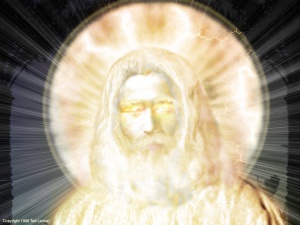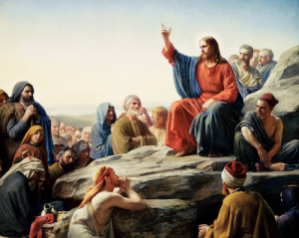There is a stark contrast between the Watchtower’s insight into Jehovah’s past dealings —his purpose and covenants and history of the ancients, and their interpretation of prophecies tied to the modern world. It is as dissimilar as day and night.
The Watchtower’s myopia is exactly as Jehovah foretold in prophecy:
“Who is blind except my servant, so deaf as the messenger I send? Who is so blind as the one rewarded, so blind as the servant of Jehovah? You see many things, but you do not keep watch. You open your ears, but you do not listen.” —Isaiah 42:19-20
Ironically, the point at which the living word of God becomes activated (as contained in Isaiah) is during the time of the end, which the presently sightless and deaf messengers of Jehovah imagine began over a century ago. That is why Jehovah speaks to a time to come, to a point in the future, when his so-called earthly organization is brought low. The prophecy continues:
“But this is a people plundered and pillaged; all of them are trapped in the holes and hidden in the prisons. They have been plundered with no one to rescue them, and pillaged with no one to say: ‘Bring them back!’ Who among you will hear this? Who will pay attention and listen for the time to come? Who has given Jacob for pillage and Israel to the plunderers? Is it not Jehovah, the One against whom we sinned? In His ways they refused to walk, and His law they would not obey.”
The problem is that the blind and the deaf suppose they are in the know. They claim they have not sinned. They claim to be humble. They boast of being in spiritual paradise. Amazingly, they claim to have been liberated from anti-typical Babylon in 1919. All that remains is for Jehovah to give them the keys to the Kingdom. Indeed, the rhetorical question posed by Jehovah long ago is more pertinent now then ever: “who among you will hear this? Who will pay attention and listen for the time to come?”
Now consider paragraph 17.
Jehovah promised Daniel that during “the time of the end,” many would “rove about, and the true knowledge” of God’s purpose would become abundant. (Dan. 12:4) Those who want that knowledge must work hard to gain it. One reference work says that a form of the Hebrew verb “rove about” conveys the idea of someone examining a book very carefully and thoroughly. No matter how thoroughly we examine the Bible, though, we cannot properly understand truths about the Kingdom unless Jehovah grants us that privilege.
The last sentence states a very important truth. No one can understand the things that God has concealed unless the Revealer of secrets grants that privilege.
Daniel himself demonstrated the truth of the matter. It was only he who was able to decipher Nebuchadnezzar’s prophetic dreams, when all of the conjurers and wise men were completely befuddled. And it was Daniel who was told to seal up the book until the time of the end. That means that only God can unseal the book. The question is, has Jehovah opened the minds of the leadership of Jehovah’s Witnesses to understand the things that have been concealed from time immemorial? First, consider the next paragraph:
Just as Jehovah progressively revealed truths about the Kingdom in the period leading up to 1914, he continues to do so during the time of the end. As Chapters 4 and 5 of this book will show, over the past 100 years, God’s people have had to adjust their understanding on a number of occasions. Does that fact mean that they do not have Jehovah’s backing? On the contrary! He supports them. Why? Because those who fear Jehovah have displayed two qualities that he loves—faith and humility. (Heb. 11:6; Jas. 4:6) Jehovah’s servants have faith that all the promises in God’s Word will come true. They show humility when they admit that they misunderstood exactly how those promises would be fulfilled. That humble attitude is reflected in the March 1, 1925, issue of The Watch Tower, which said: “We know that the Lord is his own interpreter, that he will interpret his Word to his people in his own good way and in his own due time.”
Truth rovers would do well to keep in mind that God has never concealed the basic truth. It has always been available to any honest-hearted, diligent searcher. And that is what the original Bible Students were and that is why they were able to understand the basic truth that the churches had obfuscated. But prophecy is another matter. And while humility is certainly a factor in accepting the truth, is it really humility to boast of our humble attitude? Now, consider the next paragraph:
When the Kingdom was established in 1914, God’s people had only partial knowledge of how prophecies relating to the Kingdom would be carried out. (1 Cor. 13:9, 10, 12) In our zeal to see God’s promises fulfilled, we have on occasion drawn wrong conclusions. Over the years, the wisdom of another statement made in The Watch Tower quoted in the preceding paragraph has become apparent. The article stated: “It seems to be a safe rule to follow, that prophecy can not be understood by us until it is fulfilled or in the course of fulfillment.” Now that we are deep into the time of the end, many Kingdom prophecies have been and are being fulfilled. Because God’s people are humble and willing to be corrected, Jehovah has allowed our understanding of his purpose to become more complete. True knowledge has become abundant!
The first sentence alludes to the 13th chapter of 1 Corinthians, where Paul wrote:
“For we have partial knowledge and we prophesy partially, but when what is complete comes, what is partial will be done away with. When I was a child, I used to speak as a child, to think as a child, to reason as a child; but now that I have become a man, I have done away with the traits of a child. For now we see in hazy outline by means of a metal mirror, but then it will be face-to-face. At present I know partially, but then I will know accurately, just as I am accurately known.”
The Watchtower is implying that God’s people only had partial knowledge back in 1914, but that since then they have gradually acquired complete knowledge. That certainly is an immodest thing to imply, and in doing so the Governing Body betray their own abject blindness. Think of it, the inspired apostle included himself among those who saw only a hazy outline of things, as if looking in a polished metal mirror. But what did Paul mean when he said “then it will be face-to-face”?
Certainly Paul did not accurately know the whole of it before his death. In his case seeing face-to-face can only be post-resurrection, when he sees Christ in person and knows all things.
Yet, the Governing Body are implying that they now know accurately; they no longer see the hazy outline of things, as the unenlightened apostles of yesteryear. They are presuming to say that they have seen as if face-to-face and accurately know all things —this, because of their great humility!
The painful truth is, though, virtually everything the Watchtower has written in interpretation of the prophecy of Daniel, as supposedly being fulfilled during our time, is in error. The reason for that is simple —the time of the end has not begun yet. That being demonstrably true, it means the scroll of Daniel has not been unsealed.
If anyone is inclined, Beroean-like, to closely examine the Watchtower’s writings on the topic to determine if these things are so, I have done the hard work for you. While I do not claim to know all things, it is certainly within our power to examine the things held up to be true.
Take for example the prophecy of the king of the north and south. The Watchtower makes the preposterous claim that during the time of the end the Soviet Union dominated the resources of the United States during the Cold War, when even the marginally informed surely know that the exact opposite is true. Arguably, it was the USA under President Reagan that pushed the USSR into bankruptcy by inducing the Russians to compete in an arms race, forcing the plodding, centralized communist system to devote a far larger percentage of resources to war preparedness.
Amazingly, although the prophecy of Daniel assures us that the king of the north will succeed all the way to his end at the hand of the great prince, in the quarter of a century since the collapse of the Soviet empire the all-knowing Governing Body has not seen fit to revise their interpretation that the Nazis and Soviets comprised the world-conquering king of the north.
As a shocking example of their propensity to bend the truth to fit their preferred interpretation, again, the prophecy of Daniel reveals that it is a sole earthly king —the king of the north —who is vanquished by Heaven’s king. Yet, the Watchtower unabashedly claims that the king of the north does not subjugate his rival and that both the kings of the north and south are on hand when Michael stands up. It would appear that they have not even bothered to read the 11th chapter of Daniel.
The sobering truth is, the time of the end has not begun. But when it does commence you may be assured that the truth will not be revealed over a century in drips and drabs, through a process of correcting embarrassing errors. It will be unsealed very quickly, over a short period of time —like a flash of divine light against the backdrop of the world’s darkest night. The unveiling will, of course, coincide with the manifestation of Jesus Christ, which is what Daniel’s personal interaction with the enlightening angel foreshadows; namely, the parousia; when the chosen ones will see Christ face-to-face; after when, they too “will shine as brightly as the expanse of heaven.”



